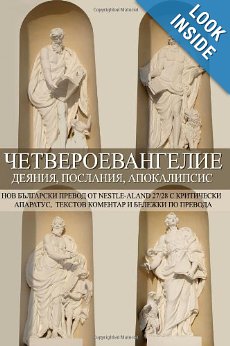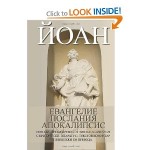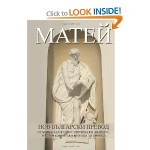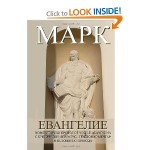Bulgarian Study New Testament
Comments Off on Bulgarian Study New Testament
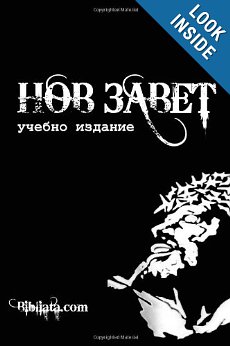 We are truly blessed to introduce for the first time the Bulgarian Study New Testament. The text is specifically designed and printed for Bulgarian immigrant churches outside of Bulgaria and specifically for the Goodwin need of Bibles, study guides and leadership literature among the Bulgarian Churches in North America. This first edition contains:
We are truly blessed to introduce for the first time the Bulgarian Study New Testament. The text is specifically designed and printed for Bulgarian immigrant churches outside of Bulgaria and specifically for the Goodwin need of Bibles, study guides and leadership literature among the Bulgarian Churches in North America. This first edition contains:
- Revised protestant Bible History of the New Testament texts
- The Story of the Bulgarian Bible
- Harmony of the Gospels
- Prologue to each book
- How can I be saved?
- What the Bible says about…
- Holy Spirit in the life of the believer
- Prayer Devotions
- Praise and Worship Lessons
- Role of the Church in the world
- Theology in contrasts
- Names and titles of Jesus Christ
- Messianic Prophecies Fulfilled
- The miracles of Jesus
- The proverbs of the Lord
- Model and use of the Tabernacle
- Maps of Biblical places
- Plan of the Last days and the Book of Revelation
The Four Gospels of the New Bulgarian Translation Published
August 15, 2013 by Cup&Cross
Filed under Featured, News, Publication, Research
We are both happy and humbled to announce the publication of the Tetraevangelion of of the New Bulgarian Translation including:
- Matthew (2011)
- Mark (2010)
- Luke: Gospel and Acts (2013)
- John: Gospel, Epistles and Apocalypse (2007)
This final volume has been almost ten years in the making as it combines all four previously published volumes. It is new literal translation in the Bulgarian vernacular directly from the Nestle Aland Novum Testamentum (27/28 editions).
We thank friends and foes for the internal motivation without which this work would have never been completed.
We are currently working on another similar project, namely the publication of a Study New Testament in Bulgarian, which will be ready for print by the end of this summer.
Luke and Acts Published (New Bulgarian Translation)
We are both happy and humbled to announce the publication of the Luke/Acts volume of the New Testament in Bulgarian. This fourth and final volume of our literal translation was presented to the churches on the day of Pentecost, which this year in Bulgaria was on June 25th. It has taken us almost seven years to complete the translation work as we published: John: Gospel, Epistles and Apocalypse (2007), Mark (2010), Matthew (2011) and finally the Luke: Gospel and Acts (2013). We thank friends and foes for the internal motivation without which this work would have never been completed. We are now working on the publication of a Study New Testament in Bulgarian, which will be ready for print by the end of this summer.
50 Bible Hour Episodes for St. George’s Day
Comments Off on 50 Bible Hour Episodes for St. George’s Day
 Our weekly Bible Hour program has reached its 50th LIVE show just in time for the Bulgarian celebration of St. George’s Day. We began this ministry endeavor in 2002 initially with 14 lessons from the Church of God Declaration of Faith, which were built to a six-month curriculum as we taught them every Sunday at the Central Church of God in Sofia and various other locations throughout Bulgaria.
Our weekly Bible Hour program has reached its 50th LIVE show just in time for the Bulgarian celebration of St. George’s Day. We began this ministry endeavor in 2002 initially with 14 lessons from the Church of God Declaration of Faith, which were built to a six-month curriculum as we taught them every Sunday at the Central Church of God in Sofia and various other locations throughout Bulgaria.
This spring we filmed ten of the lessons to be included with the rest of the weekly broadcast and another ten will be released by the end of the summer. Just recently, we also published the lessons in an easy to use study book which can be implemented in the Sunday School format in dozens of our churches in Bulgaria.
And last but not least, for the Bulgarian culture and heritage holiday on May 24th, our team released a Bulgarian Study New Testament.
Annual Conference of the Bulgarian Churches in North America
Comments Off on Annual Conference of the Bulgarian Churches in North America
 Bulgarian Churches in the United States meet this weekend for their annual conference in Dallas, Texas. They are hosted by the local Assemblies of God as the Bulgarian churches represent Full Gospel, Foursquare, the Church of God and independent works. Currently, there are regular Bulgarian church meetings in Chicago, Dallas, Houston, Las Vegas, Los Angeles and Minneapolis. Through the years, small groups have sporadically started meetings in Buffalo, St. Louis, Seattle and three places in Florida: Ft. Lauderdale, Tampa and Jacksonville. Through the years, we have assisted with the church projects in Atlanta, San Francisco and Washington, D.C. There have also been attempts to restore the meetings in Washington State, where the difficulty is that most Bulgarians live in the outer suburbs.
Bulgarian Churches in the United States meet this weekend for their annual conference in Dallas, Texas. They are hosted by the local Assemblies of God as the Bulgarian churches represent Full Gospel, Foursquare, the Church of God and independent works. Currently, there are regular Bulgarian church meetings in Chicago, Dallas, Houston, Las Vegas, Los Angeles and Minneapolis. Through the years, small groups have sporadically started meetings in Buffalo, St. Louis, Seattle and three places in Florida: Ft. Lauderdale, Tampa and Jacksonville. Through the years, we have assisted with the church projects in Atlanta, San Francisco and Washington, D.C. There have also been attempts to restore the meetings in Washington State, where the difficulty is that most Bulgarians live in the outer suburbs.
See all Bulgarian Churches in the United States, Canada and Europe on our catalog website http://bulgarianchurches.com/
Bulgarian Elections 2013
 Although one of the rightist parties just won the 2013 parliamentarian Bulgarian elections by a fraction, it lacks the needed majority to form an independent government. The Socialist party, second in the ballot, is searching an uneven alliance with the nationalists from “Attack” and the Turkish ethnic DPS (Right and Freedom Movement). Neither the Union of democratic forces nor the political movement of ex-king Simeon II Saxe-Coburg-Gotta was able to cross the 4% election barrier required to enter Parliament. Thus, the only two parties who in years past were able to form independent democratic governments (respectively 1997 and 2001), now remain in the periphery of Bulgari’s political life.
Although one of the rightist parties just won the 2013 parliamentarian Bulgarian elections by a fraction, it lacks the needed majority to form an independent government. The Socialist party, second in the ballot, is searching an uneven alliance with the nationalists from “Attack” and the Turkish ethnic DPS (Right and Freedom Movement). Neither the Union of democratic forces nor the political movement of ex-king Simeon II Saxe-Coburg-Gotta was able to cross the 4% election barrier required to enter Parliament. Thus, the only two parties who in years past were able to form independent democratic governments (respectively 1997 and 2001), now remain in the periphery of Bulgari’s political life.
BBC: Bulgaria election fails to end political stalemate
DW: Bulgaria election fails to end political deadlock
NYT: Few Vote in Bulgaria as Apathy Prevails
In regard to the current political crises, as early as 2009 our team warned that if the newly elected government continues to use the same local level (city, municipality) political paradigms to run the country as EU member crises will be inevitable. Two years later, as half of the parliamentarian term has passed, we further advised in “Election’s Perspectives for Bulgaria” that as Bulgaria’s Prime Minister elect did not take the much expected place as a presidential candidate, his political strategy would be strongly criticized by his opponents as inadequate and insufficient to answer Bulgaria’s problems. In the beginning of 2013 as political distress grew, the government was forced to resign amid open protests and high rate of the government disapproval.
Meanwhile, after almost entering Bulgaria’s parliament in 1997, the Bulgarian Christian Coalition, traditionally representing the Protestants in the country, remains on the borderline of any political existence. Bulgarian evangelicals were never able to reach their political legacy again, although the new Bulgarian census showed over 25% increase of evangelical population in Bulgaria to some 65,000 people strong. The alternative party, Christian Democratic Forum has showed no political activity since it was established a decade later and quickly defeated by having less than 1,000 votes nationwide. The Bulgarian Christian Coalition has also chosen not to run in the upcoming elections.
Newly Revised Bible Released for the Bulgarian Easter
 The Revised Version of the 1940 Bulgarian Bible, which our ministry has been working on since 2005 and released earlier in 2012, was presented at various book markets, festivals and churches for the Bulgarian Easter on May 5th.
The Revised Version of the 1940 Bulgarian Bible, which our ministry has been working on since 2005 and released earlier in 2012, was presented at various book markets, festivals and churches for the Bulgarian Easter on May 5th.
The 1940 revision was initiated in 1920-24 by the British and Foreign Bible Society, reprinted multiple times and smuggled in Bulgaria under communism. It is perhaps the most read Bulgarian Bible of all times. While a number of new versions have attempted to replace it, this revision made by our team in the past seven years while ministering in Bulgaria has preserved the original text in its entirety and made it available to Bulgarian readers abroad.
Bulgarian Bibles to be released by our team in the summer of 2013:
- May 24, 2013: Bulgarian Culture Holiday: A New Study New Testament with commentary, charts, maps and explanatory annotation
- June 23, 2013: Pentecost in Bulgaria: Luke: A New Bulgarian Translation – the final of four volume new translation series which we began in 2007
Bulgarian Bible Revisions and Translations released by our ministry so far:
- 1871 Constantinople Bible (in its final Vienna Revision of 1914)
- John: A New Bulgarian Translation (2008)
- Matthew: A New Bulgarian Translation (2010)
- Mark: A New Bulgarian Translation (2011)
Distinct Historical Memories of the Bulgarian Mindset
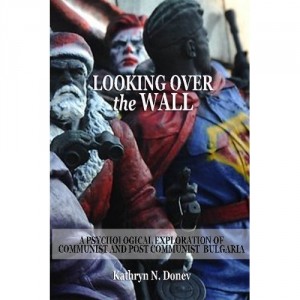 Nearly 25 years after the fall of the Berlin Wall traces of communism still remain throughout Bulgaria. For those who lived directly under communism these traces include mental footprints which daily influence these individuals’ approach to life. For that generation who has no personal memory of communism, they find themselves indirectly influenced by the physical traces that will forever be a part of the undeniable history of Bulgaria.
Nearly 25 years after the fall of the Berlin Wall traces of communism still remain throughout Bulgaria. For those who lived directly under communism these traces include mental footprints which daily influence these individuals’ approach to life. For that generation who has no personal memory of communism, they find themselves indirectly influenced by the physical traces that will forever be a part of the undeniable history of Bulgaria.
Historically, Bulgaria, similar to other Balkan countries, has gone through turmoil, slavery and defeat. Though Bulgaria is the quietest and most obscure nation on the Balkan Peninsula, its people are confronted with the typical social obstacles that plague former communist-bloc countries: slow reform, economical, educational and cultural destitution and moral confusion.
Due to such rich history, Bulgarians have distinct historical memories and it is this distinctiveness that produces their national identity. These similar yet unique experiences of economic ordeals and historical legacy are what shape the Bulgarian mentality. The economical, educational, political and cultural crises have remained an indivisible part of Bulgaria’s reality. And Bulgaria’s evangelical community of more than 100,000 people has its own set of unique anxieties and hardships.
Excepts taken from “LOOKING OVER the WALL”
A Psychological Exploration of Communist and Post Communist Bulgaria
Copyright © April 12, 2012 by Kathryn N. Donev
© 2012, Spasen Publishers, a division of www.cupandcross.com
RELATED ARTICLES:
[ ] Obama, Marxism and Pentecostal Identity
[ ] A Psychological Exploration of Communist and Post Communist Bulgaria
[ ] Insight into Communist Agent Techniques in Bulgaria
[ ] The Bulgarian Evangelical Believer and Communistic Consequences
[ ] Distinct Historical Memories of the Bulgarian Mindset
[ ] National Identity and Collective Consciousness of the Bulgarian Community
The Liberating Spirit
![9780802807281[1]](https://cupandcross.com/wp-content/uploads/2013/07/97808028072811.jpg) The Liberating Spirit is an analytical examination of the Pentecostal movement in the Latino community. Pentecostalism is presented as a social transformation factor. The research is written for a scholarly audience, though it is understandable by the common believer as well. It argues for a “pneumatic” social ethic, and urges Pentecostals to move beyond selective preaching of salvation and to address such systemic issues as human rights, social injustice, racism, etc.
The Liberating Spirit is an analytical examination of the Pentecostal movement in the Latino community. Pentecostalism is presented as a social transformation factor. The research is written for a scholarly audience, though it is understandable by the common believer as well. It argues for a “pneumatic” social ethic, and urges Pentecostals to move beyond selective preaching of salvation and to address such systemic issues as human rights, social injustice, racism, etc.
The study follows a well developed structure which integrates Pentecostalism and social transformation within the context of a Hispanic American culture. Chapters one and two of the study deal with the Hispanic American culture through focusing on the Hispanic immigration in North America. Chapter three is an overview of the Hispanic Pentecostal reality to identify the Pentecostal church as a center for liberation from oppression in the context of Pentecostal eschatology. Chapter four provides Scriptural proof for the presented ideas, and chapter five concludes the research with a presentation of social ethic for the Hispanic American Pentecostals.
Pentecostal churches are presented as traditionally unlearned in their majority, but always open to the needs of the poor among them. Villafane even speaks of “menesteroso” (the oppressed) as a main focus of concern of the Pentecostal churches. Since its beginning the movement has emphasized the inclusiveness of the Christian community existing in the context of Christ’s love for all with special emphasis on the poor, suffering, sick and oppressed.
Being concern with all of these, Pentecostalism has viewed the pneumatic theology and praxis not only as a heritage of its ethos, but also as means through which social justice is made possible within the church and the world which the church reaches through ministry. In the pneumatic part of the research, the author responds to Karl Barth’s dream for theology of the Spirit. Villafane sees Pentecostalism as the movement that brings such theology.
In relationship to the immigration dynamics, the author gives an extensive overview of the Latin American immigrants and the way they experience their ethnic belongingness. Villafane shows that Latin American immigrants form at least four groups of language preferences (1) English only, (2) Bilingual with English preferences, (3) Bilingual with Spanish preferences and (4) Spanish only. This division is somewhat different than the Bulgarian language preference. At this present time, research shows that all Bulgarian immigrants speak some English but prefer Bulgarian among them. Also, all Bulgarian-born immigrants have studied Russian beside Bulgarian and English, but do not use it in their communication within or outside of the Bulgaria community. And finally, at this time there is no English only preference group among the Bulgarians. Perhaps such will be formed when a second generation of Bulgarian immigrants emerges in America.
Another interesting point of difference is the ethnos of the immigrant communities. Villafane shows that Latin American immigrants represent five such groups as follows:
- Mexicans 61%
- Puerto Ricans 15%
- Cubans 6%
- Central and South America 10%
- Other Nations 8%
The ethnic structure of the Bulgarian immigration in North America is close to the ethnic ratio in the Bulgarian nation which are: Bulgarians 80%, Turks 12%, Roma (6%) and others 2%. This presents several major differences between the Latin American and Bulgarian diasporas which are:
(1) The Latin American diaspora represents a much larger ethnic and geographical area from which immigrants have come than the Bulgarian one.
(2) The Latin American diaspora represents a much larger immigrant group in North America, with a longer history and large geographical location than the Bulgarian one.
(3) The Bulgarian diaspora represents a less defragmenter community as a large majority (80%) is Bulgarians. In the Latin American case almost 50% of the immigrants are with different ethnic background.
(4) The Bulgarian diaspora represents a different ethnic group, which differ not only by national belongingness, but by language as well.
In this context it must be critically noted that until recently cultural assimilation was considered an inevitable fact which can be prevented neither by the assimilating culture nor by the assimilated culture. It was considered that once a group of two or more cultures meet, assimilation begins. In America, however, assimilation is no longer seen as an inevitable process. Instead a cultural diversity exists in a rather mosaic structure described by the term “segmented assimilation.” Such phenomenal ethnic formation derives from the multiplicity of lifestyles and worldviews that formed a contemporary American culture. The technical term for this new mixing is “transnationalism.”
Villafane’s research further offers an in-depth overview of the Latin American communities in North America examining their culture and paradigms and influence of Pentecostal ministry among them. The text speaks of the “homo socius” or the person in the context of community, claiming that an individual is only a person when acting in the social context. A certain transformation from one social context to another is also suggested when viewed in cross-cultural dynamics of immigration, assimilation and naturalization. These processes are similar within the Bulgarian immigrant communities in North America in relation to the ministry of Protestant churches among them.
The Bulgarian Christian communities are searching for a model of adjustment to the assimilating culture in which they exist. This can be accomplished by adopting a strategy of incorporating the postmodern setting of worship, theology and praxis within the Bulgarian Christian community. It should be accompanied by an intentional process of liberation from the dysfunctional model through which the Bulgarian Protestant Church operated during the Communist Regime (1944-1989). This process should purpose to liberate the believers from an oppression mentality and transform them toward the mind of Christ, in order to minister effectively in the present context of existence. Failure to address this present dilemma will result in an inability of the Bulgarian Christian community to communicate its faith and to minister to the younger, faster-adjusting generation of Bulgarian-Americans, whose religious belongingness remains unexplored and often even unknown to themselves.
In all cases, the Bulgarian Evangelical churches accept the responsibility of being much more than a religious center, as it serves as a social and ethno-cultural center as well. Thus, in the context of ethic assimilation and cultural regrouping, the Bulgarian churches not only remain a protector of the Bulgarian ethnicity and the Bulgarian way of life, but also acts as an agent of cultural integration. Naturally, as such it has received the attention of Bulgarian immigrants who have altered it to meet present needs.
National Identity and Collective Consciousness of the Bulgarian Community
 In understanding the history of the advancements in psychotherapy in Bulgaria and the foundations of the country as a whole, we gain a glimpse into the national identity and collective consciousness of a community; one which was formed by a strong people; a people that strive for religious freedom and the quest for knowledge; one that overcame oppression, trial and, hardship.
In understanding the history of the advancements in psychotherapy in Bulgaria and the foundations of the country as a whole, we gain a glimpse into the national identity and collective consciousness of a community; one which was formed by a strong people; a people that strive for religious freedom and the quest for knowledge; one that overcame oppression, trial and, hardship.
For many Bulgarians, communism was not simply a set of ideological directives, but it permeated nearly all spheres of social life. Communism and the lasting effects on its population is not one that is comfortable to recollect. It is neither something that is easy to understand and we may never fully comprehend the post communist mentality. And perhaps we should question those who make such claim.
However, if left ignored, we ignore an undeniable part of history and identity. The danger in not recollecting is that we may in doing so, ignore the possibility for change. Recognition is the first step toward change and empathy. It is only via the shoes of empathy that we can walk in the paths of genuinely comprehending the post communistic mentality and another culture.
Excepts taken from “LOOKING OVER the WALL”
A Psychological Exploration of Communist and Post Communist Bulgaria
Copyright © April 12, 2012 by Kathryn N. Donev
© 2012, Spasen Publishers, a division of www.cupandcross.com
RELATED ARTICLES:
[ ] Obama, Marxism and Pentecostal Identity
[ ] A Psychological Exploration of Communist and Post Communist Bulgaria
[ ] Insight into Communist Agent Techniques in Bulgaria
[ ] The Bulgarian Evangelical Believer and Communistic Consequences
[ ] Distinct Historical Memories of the Bulgarian Mindset
[ ] National Identity and Collective Consciousness of the Bulgarian Community


